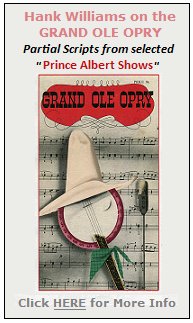


|
When you read the first paragraph, try thinking about all the leaders that you've heard of in one lifetime. I know that you can find many of them; some were political leaders, others lead small groups dedicated to various activities. Now that you've got all the leaders of the world, past and present, in one collective mental room, let's separate them. Divide them into different walks of life; the doctors, lawyers, writers etc. Now, pick out the leaders who gave up a promising career under the spotlight in order to help others achieve greatness in their own special way. You can't do this without eventually finding the man known as 'the Song Doctor'. Fred Rose was born in Evansville, Indiana on August 4th, 1897. He had very little formal education - it is doubtful whether or not he passed the third grade. But as a young child he was writing music and playing piano in slamn honkeytonks for what money he could get. Let's compare this with some music history. When Rose was a child, (possibly in his early teens), Jazz was in its infancy, the idea of recorded sound had just become a commercial enterprise, and Scott Joplin was writing his Piano Ragtime music. I would imagine that, as a honkytonk pianist, Rose had been exposed to Joplin's music, or at least to music of similiar artists and composers. On into the Twenties, Rose began to leave his mark on Tinpan Alley as a songwriter and entertainer. Among others, his major compositions included "Indeed I Do" and the Sophie Tucker Hit "Red Hot Mama" Again, let's compare things musically. This was in the mid to late twenties, if not earlier. At this time, Jimmie Rodgers was taking Country Music on its first journey 'Uptown'. Vernon Dalhart had stepped into hillbilly music with American folk songs. Fats Waller was making his first recordings as a side man, and as a solo artist. He was also cutting piano rolls for Q.R.S. out of Chicago. Fred Rose was working as a side man with Paul Whiteman's Orchestra. He was performing on Radio, as well as Piano Rolls (also for Q.R.S). At this time, another artist was about to cross paths with Fred Rose. Fred played piano on some of his Brunswick sides. You guessed it, Bing Crosby. But, like all artists, Rose's career took a slump with 'the crash of 1929'. During the long years of the Great Depression, he took what work he could get and sold his songs to anyone who was willing to publish them. But, few people had the money in those days and publishers were no exception. He worked minstrel shows, beer joints and he had a spot on WSM in Nashville. This program was called "Freddie Rose's Song Shop". The format was unique; people would send in titles and 'Freddie' would write the songs and present them on the air. I can't help wondering whether any of those songs ever became hits, or what the actual show sounded like. Now, we've reached a point when Country Music was growing as a recorded art form. At this stage it suffered, as critics refused to accept Country Music as the fine art it was. Dalhart had left the music field by now and moved to Connecticut and Fred Rose was about to write songs for Gene Autry. This took his career to a new height. Autry recorded the Rose compositions "Be Honest With Me" and "Tears on My Pillow", followed along by other tunes used in Autry's Western Movies. This led Fred Rose to his interest in Country Music. In 1942, Roy Acuff wanted to start a publishing firm in Nashville, which was becoming a major recording centre. He wanted Rose to handle the music end of the deal. All they needed was $25,000. Acuff sat down and wrote out the cheque...Acuff-Rose Publishing was born! Not only did this mean support for the newly formed B.M.I. Organization, but now writers could go to an alternate, rather than California or New York City. When this was accomplished, it took much of the clout away from the 'big wheels' in New York. Rose's songs kept coming out; Acuff recorded "Blue Eyes Crying in the Rain" and "Highways are Happy Ways" became a standard. In order to keep writing songs and helping other writers, he handed the responsibilty of the publshing firm to his son, Wesley, who had previously worked in accounting for Standard Oil. This was in 1945, a year before an Alabama country boy began his journey onto the world-wide stage. So now we've come a long way from the days on Radio with Elmo Tanner, the Whistler, to Fred Rose, as a publisher, song-writer and teacher. The story of the association of Fred Rose and Hank Williams has ben told over and over again and I feel that it is really not necessary to repeat well known events. We all know what Hank Williams meant to Fred Rose and, equally important, what Fred Rose meant to Hank Williams The Fred Rose story does not end here. Other names associated with Rose, include "Bill Carlisle", "Bob Wills" (Rose produced some of Bob's M.G.M. sides), "Leon Payne", "Paul Howard" and "Marty Robbins", to name a few. In 1952-53, Acuff-Rose started Hickory Records. Roy Acuff and Bill Carlisle eventually recorded on that label, but the first hit for them was Al Terry's recording of "Good Deal Lucille". About this time, Rose's 1946 hit, "tenderhearted Sue" was released on Columbia. Other Rose compositions were being heard nationally; "Take these Chains", "Blue Eyes Crying in the-Rain" was recorded by Slim Whitman, "Faded Love and Winter Roses" was eventually released with Hank Sr., backed by his Martin Acoustic guitar. But, Fred Rose was an active writer until his passing in 1954. His contributions to music live on today. Willie Nelson has revived it, others will continue to record his songs and material written under his care. Fred Rose gave us so much as a writer, I wouldn't be surprised if I were to find out that he died from "writer's cramps"! As for a monument to Fred Rose's memory, we needn't build one; I have several around me in this room in which I write. Every singer takes something of what he left us. He helped other writers, even polishing some of Williams' material. They affectionately call him the "Song Doctor"..Why not? He earned. In closing, I would like to thank Wesley Rose for granting me the interview from which much of this article was derived. The rest came from LP covers. |


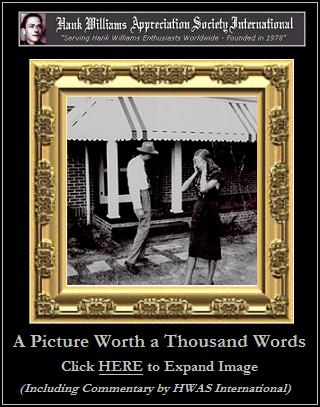
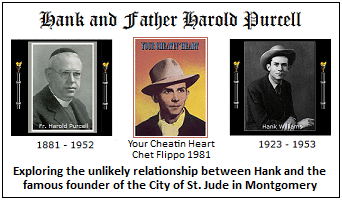

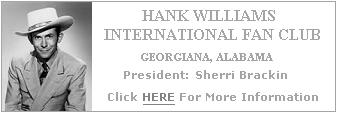


 Click
HERE for UPDATES on Hank's 50th Anniversary events in Germany
Click
HERE for UPDATES on Hank's 50th Anniversary events in Germany Click
HERE and view a Photo of above mentioned German 'Hank' Event
Click
HERE and view a Photo of above mentioned German 'Hank' Event
 Click HERE and read: "MY FASCINATION FOR HANK WILLIAMS" written
Click HERE and read: "MY FASCINATION FOR HANK WILLIAMS" written  Click
HERE to view a 2013 Photo of Mr. Reinhardt receiving a certificate
Click
HERE to view a 2013 Photo of Mr. Reinhardt receiving a certificate Click HERE to view our collection of RARE HANK WILLIAMS POSTERS & HANDBILLS
Click HERE to view our collection of RARE HANK WILLIAMS POSTERS & HANDBILLS

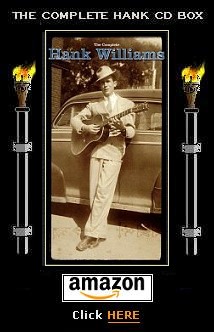






 Email: Web Administration wwwebmonitor@yahoo.com
Email: Web Administration wwwebmonitor@yahoo.com 
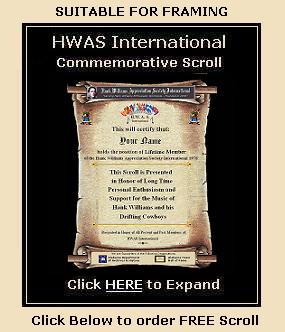

 Click HERE and read a Brief History of the
Click HERE and read a Brief History of the Click HERE and read the nice letter to HWAS
Click HERE and read the nice letter to HWAS Click
HERE to View HWAS Membership POSTER
Click
HERE to View HWAS Membership POSTER Click
HERE to View: HWAS Membership TEXT FILE
Click
HERE to View: HWAS Membership TEXT FILE Click
HERE and View a HWAS Membership TEXT FILE
Click
HERE and View a HWAS Membership TEXT FILE Click
HERE to View the HWAS Membership Applications
Click
HERE to View the HWAS Membership Applications

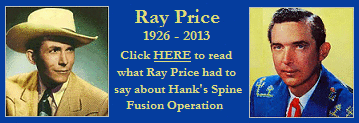


 _
_
 _
_
